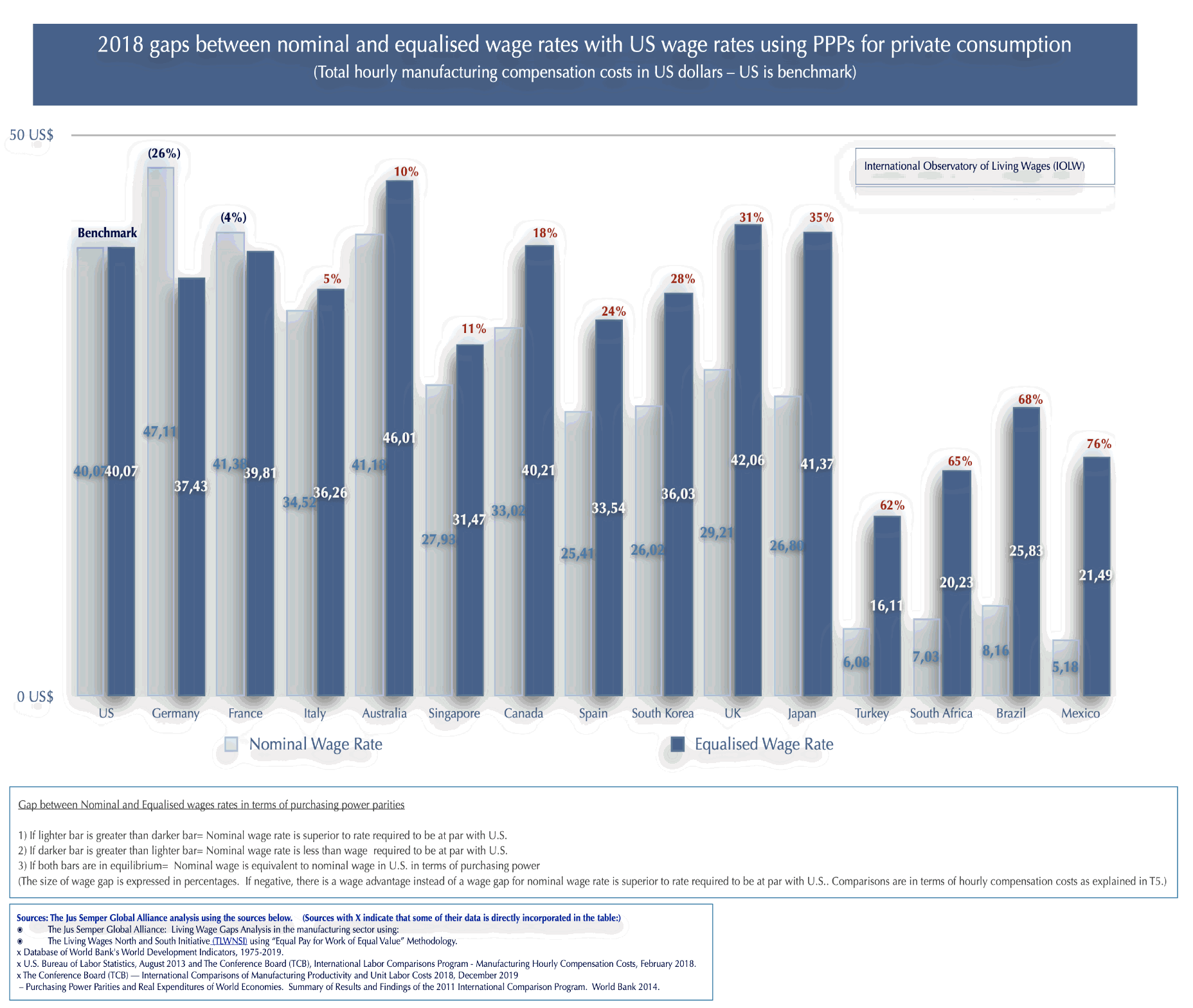Wage rate gap comparisons for selected economies
Our 2018 assessment reports divergent outcomes among selected economies that were predominantly the result of a meaningful increase of hourly wages in local currency (or lack of it), exchange rates and changes in their PPP cost of living. Six economies improved their position, four lost ground and four did not change. France, Germany, Italy, South Korea, Singapore and Australia improved their equalisation index (Eq-Idx). Canada, The United Kingdom, Spain and Turkey lost ground compared to their 2017 position.
Among the six economies that improved their living-wage equalisation position, the main factors were the substantial increase of their hourly rates in local currency combined with a revaluation of their currency or a decrease in their cost of living in PPP terms for private consumption. In the case of the three euro-area countries (France, Germany and Italy), it was specifically the combination of the increase of their hourly wage rates with a 4,8% revaluation of the euro. This allowed France and Italy to increase their equalisation Eq-Idx two points (104 and 95 respectively) and Germany one point to 126. This combination served to offset their increase of their PPP cost of living, which averaged 4,3%, and increased their advantage over the 1,8% increase of the US hourly rates in real terms. A similar behaviour took place in the case of Singapore and South Korea, which averaged an increase of their hourly rates in local currency of 6,3%, revalued their currencies an average of 2,6% and increased their PPP cost of living by an average of only 1,6%. In this way, they clearly outperformed the 1,8% increase of the US hourly rate in manufacturing and thus increased their equalisation Eq-Idx by six and three points to 89 and 72 respectively in 2018. In fact, Singapore’s 89 Eq-Idx is its best record since 1996. Australia, in contrast, devalued its currency, but it achieved the highest improvement of its equalisation Eq-Idx among all 41 economies in our reports by increasing it nine points to a 90 Eq-Idx, which is equal to its best position previously achieved in 2014. This was the result of a strong increase (6,6%) of its hourly rate in local currency and a 2,5% currency devaluation, which contributed to a drop of its PPP cost of living of 2,9%.
Among the four economies losing ground, Canada was the worst, losing 3 points (82 Eq-Idx), followed by the United Kingdom (69 Eq-Idx) and Spain (72 Eq-Idx), each losing 2 points and Turkey losing one point (38 Eq-Idx). Canada’s drop was the direct result of a rare drop of its hourly rate in manufacturing in local currency, with minimal change in its PPP cost of living and exchange rate. Spain lost two points also as a result of a 0,6% drop of its hourly rate in euros—the only country in the euro area recording a drop—and a meaningful increase of its PPP cost of living of 5,1%. The United Kingdom also lost two points due to an increase of only 0,6% of its hourly rate in local currency and a 4,2% increase of its PPP, despite a 3,7% revaluation of the pound. Lastly, Turkey also lost one point due to a very steep devaluation of the lira of 24,5%, despite a strong increase of its hourly rate in local currency of 13,2% and a strong drop of 14,2% of its PPP cost of living.
Among the economies with no change in their Eq-Idx, Brazil managed to remain with an index of 32, the same since 2016, due to the strong devaluation of its currency by 12,7% and also a steep drop of its PPP cost of living of 11,6% and an increase of its hourly rate in local currency of 2,4%, which is slightly higher than the 1,8% increase of the US hourly rate. Mexico actually increased its Eq-Idx but not enough to gain one point, thus remaining at 24 points (in rounded numbers), which is the same as in 2016. Mexico increased its hourly rate in local currency by a meaningful 6,4% in 2018, but experienced a 1,7% currency devaluation and an increase of 0,5% in its PPP cost of living, actually moving from a 23,6 index to a 24,1 index. Although Mexico appears to be improving its index, it has gained only five points since 1996, which is barely meaningful relative to the 22-years period of assessment. Japan experienced no change in its Eq-Idx due to a PPP increase of 1,3%, little increase in local currency (0,9%) and a currency revaluation of 1,6%. Lastly, South Africa recorded no change in its Eq-Idx due to a PPP increase of 2,8%, which offset the increase in local currency (3,8%), and a minimal revaluation of only 0,8%. Although this allowed South Africa to remain at its highest recorded index since 1996, its improvement in equalisation has been of only five points since 2010.
Beyond the context of this analysis, we must realise that capitalism of any kind is incompatible with the purpose of a truly democratic ethos, which is the procurement of the welfare of all ranks of society and the sustainability of the planet. Thus, under the current system this purpose will never take place and, therefore, there is no reason to regard improvements in manufacturing wage rates or minimum wages as positive signs of what we can expect in the coming years. Unless people realise that we need to force a new radical social contract that wholly replaces the capitalist system, we will expect more inequality, environmental depredation and the unsustainability of life on our planet. We are running out of time globally, because the capitalist system is completely unsustainable and we are already on the brink of being unable to secure the survival of all living things. There is an enormous amount of scientific research that provides incontestable proof to this reality, including stark changes in the climate and pandemics such as the present COVID-19 that we are enduring. Given this ominous situation, demand-side and other socially-oriented policies will lose any meaning as we reach a tipping point of no repentance and no return when future generations will no longer have a chance to live with dignity, as the planet increasingly reacts in ways that no longer provide the conditions indispensable for life as we know it. Unless we replace the current system, life in our planet will reach its demise as the result of the ecological rift produced by our anthropocentric era.

- © The Jus Semper Global Alliance

| Home |  | Resources |  | Labour Resources |  | WGC-AEM |  | Wage Gap 12 LG1 |

